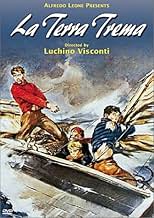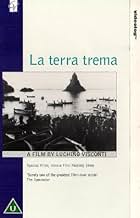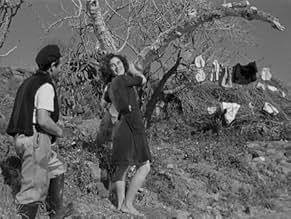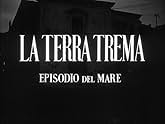AVALIAÇÃO DA IMDb
7,8/10
6 mil
SUA AVALIAÇÃO
Na zona rural da Sicília, os pescadores vivem à mercê de atacadistas gananciosos. Uma família arrisca tudo para comprar seu próprio barco e operar de forma independente.Na zona rural da Sicília, os pescadores vivem à mercê de atacadistas gananciosos. Uma família arrisca tudo para comprar seu próprio barco e operar de forma independente.Na zona rural da Sicília, os pescadores vivem à mercê de atacadistas gananciosos. Uma família arrisca tudo para comprar seu próprio barco e operar de forma independente.
- Direção
- Roteiristas
- Artistas
- Prêmios
- 1 vitória e 1 indicação no total
Luchino Visconti
- Narrator
- (narração)
- (não creditado)
Antonio Pietrangeli
- Narrator
- (narração)
- (não creditado)
Antonio Arcidiacono
- Ntoni
- (não creditado)
Giuseppe Arcidiacono
- Cola
- (não creditado)
Venera Bonaccorso
- La vecchia che ride
- (não creditado)
Nicola Castorino
- Nicola
- (não creditado)
Rosa Catalano
- Rosa
- (não creditado)
Rosa Costanzo
- Nedda
- (não creditado)
Alfio Fichera
- Michele
- (não creditado)
Carmela Fichera
- La baronessa
- (não creditado)
Agnese Giammona
- Lucia
- (não creditado)
Nelluccia Giammona
- Mara
- (não creditado)
Ignazio Maccarone
- Maccarone
- (não creditado)
Giovanni Maiorana
- Un bambino
- (não creditado)
Antonino Micale
- Vanni
- (não creditado)
Maria Micale
- La madre
- (não creditado)
- Direção
- Roteiristas
- Elenco e equipe completos
- Produção, bilheteria e muito mais no IMDbPro
Avaliações em destaque
Although it was supposed to be a documentary, Visconti put in a slight story line to achieve what a documentary would have done, AND MORE. --He used no professional actors, just native Sicilian fishermen, and other villagers, to play all parts. -- The film uses no artificial lighting, no sound enhancement, sound-effects, or dubbing. -- It was filmed on location in, and around, the crumbling homes of the poor villagers, and it was recorded in the Sicilian dialect (rather than proper Italian), and although it has a documentary "look", Visconti shows the exploitation of the poor by the capitalist middlemen so much more effectively than any documentary could have done.
-- Also, while not the first neo-realist film of that post-war Italian genre, this was the first film to be described by the term: "neo-realist". --A brilliant film on all counts. I rated it "10".
-- Also, while not the first neo-realist film of that post-war Italian genre, this was the first film to be described by the term: "neo-realist". --A brilliant film on all counts. I rated it "10".
This moving slice of life has several acts and moves like an opera, but the scenes are "neo-realistic" in the best sense.
All of Visconti's actors are from the Sicilian fishing village, but they were not acting--just portraying their lives. You care about these real people!
Family is everything--and it survives despite the buffeting by the storms, the stranglehold of the oligarchical wholesalers, and shortsightedness of the townspeople. We see the exploitation of the fishermen vividly and how most accept it as "God's will."
It also brings to mind the old joke: What is the difference between capitalism and communism? Capitalism is the exploitation of man by man, and communism is just the reverse.
All of Visconti's actors are from the Sicilian fishing village, but they were not acting--just portraying their lives. You care about these real people!
Family is everything--and it survives despite the buffeting by the storms, the stranglehold of the oligarchical wholesalers, and shortsightedness of the townspeople. We see the exploitation of the fishermen vividly and how most accept it as "God's will."
It also brings to mind the old joke: What is the difference between capitalism and communism? Capitalism is the exploitation of man by man, and communism is just the reverse.
Luchino Visconti's vivid portrayal of the grinding poverty endured by Sicilian fishermen under the oppressive rule of grasping wholesalers is a relentlessly grim saga that casts an unflattering light on the crowd's blind propensity to condemn those who strive to rise above their lot in life. Depressing stuff, but hugely compelling in spite of its lengthy running time.
1. This movie is likely to excruciate those who are not used to reading fast, because the images are too great to be sacrificed for subtitles. Even most of the Italian-speaking people have a hard time understanding this Sicilian accent.
2. The other reason why La terra trema is found boring by many is that reality matters much more than drama to the neorealist director Luchino Visconti. So the audience shouldn't be passive while seeing some real lives going on, that is the only way to feel engaged.
3. The most notable advantage of the movie comes to attention right here. It is touching without bending over backwards for that purpose. You can feel connected to it and at the same time wonder where all that connection comes from. (The movie does not try hard to make you feel this way) It shakes your deepest emotions simply because all it has to do with is the reality of a human society, and also with the real nature for that matter.
4.Another important point here is Visconti doesn't let the fact that he believes in Socialism affect the reality of what he is portraying. The hammer and sickle on the wall in no way seems anything other than part of a neutral report. He reminds us of those journalists who succeed in providing us with an unbiased report regarding a massively resented dictator when we are pretty sure the journalist hates the dictator as much as we do.
5. All in all this is a great picture , of course it requires active audience who know what they want to get from the almost sheer reality pictured.
2. The other reason why La terra trema is found boring by many is that reality matters much more than drama to the neorealist director Luchino Visconti. So the audience shouldn't be passive while seeing some real lives going on, that is the only way to feel engaged.
3. The most notable advantage of the movie comes to attention right here. It is touching without bending over backwards for that purpose. You can feel connected to it and at the same time wonder where all that connection comes from. (The movie does not try hard to make you feel this way) It shakes your deepest emotions simply because all it has to do with is the reality of a human society, and also with the real nature for that matter.
4.Another important point here is Visconti doesn't let the fact that he believes in Socialism affect the reality of what he is portraying. The hammer and sickle on the wall in no way seems anything other than part of a neutral report. He reminds us of those journalists who succeed in providing us with an unbiased report regarding a massively resented dictator when we are pretty sure the journalist hates the dictator as much as we do.
5. All in all this is a great picture , of course it requires active audience who know what they want to get from the almost sheer reality pictured.
Luchino Visconti's epic on a family living in the Sicilian fishing village of Trezza, the Valastros, is a compelling story, told with sincerity and skill, and for the outsider viewing into their world it's at the least interesting and at its most heart-felt is rather affecting. Narrators Visconti and Antonio Pietrangeli themselves are outsiders to the world of dirt-poor fishermen who work their entire lives to earn pittance for the wealthy wholesalers (it's based on a novel, I Malavoglia- translated as Ill Will- by Giovanni Verga).
Their narration can hint the audience member on little details that wouldn't be known from the characters, however sometimes their voice-over, in such a documentary style (before this Visconti was among a group of directors for a documentary during world war 2 that is not listed on this site but it mentioned in the documentary My Voyage to Italy) can be a little deterring as they mention certain emotions the characters are feeling that we as the audience can determine right in the eyes.
The story tells of the Valastros, in particular 'Ntoni, an idealist who returns from fighting in the war with a much different view of the environment around him than what his elders would want to believe. Unlike his grandfather, who has worked for the wholesalers and not earned and saved a cent more or less than his children, he wants change in the way things are done, and soon gets enough money to build his own boat and to sell his own fish.
Things look optimistic, until nature intervenes in destroying the boat, leaving 'Ntoni without a job, the wholesalers laughing at him mercilessly and little by little loosing any respect he had in the village. His other family members also get time on the screen- two sisters who want to meet a man to marry, and how one is at the will of God and the other is at the will of the Don of the village, Don Salvatore; also a brother, who after losing his job becomes a smuggler bringing in cigarettes. Their stories, in a pacing that may have some wondering when it will end and some wondering if it can go on longer, lead up to a heartbreaking climax for each of them.
I learned shortly after viewing La Terra Trema that Luchino Visconti (I suppose it shouldn't have been much of a surprise considering the state Italy was in before, during, and after the war) was a lifelong member of the Communist party despite being raised in a wealthy environment in Northern Italy. While I had a feeling there was something about the way Visconti depicted the Volostros and the nature of the people and the village that seemed "for the working man", but I didn't really feel that the political intonations were a crutch to the overall execution of the film. Since one of the pin-points of neo-realism is to tell things as simply as they unfold in real life, no matter how downtrodden it can get, the focus of the fishermen versus the wholesalers is made more as a reflection of basic good versus evil, and it can appeal to those who don't want a strict tale of classes.
Its humanity is what shines through, and that is what should appeal to connoisseurs of neo-realism and Italian filmmaking; while I can't quite recommend it as much as The Bicycle Thief or Open City, I can recommend it as the first film people should see if they want to know and understand the work of Visconti, his operatic intonations with his players a graceful counterpart to his documentary techniques.
Their narration can hint the audience member on little details that wouldn't be known from the characters, however sometimes their voice-over, in such a documentary style (before this Visconti was among a group of directors for a documentary during world war 2 that is not listed on this site but it mentioned in the documentary My Voyage to Italy) can be a little deterring as they mention certain emotions the characters are feeling that we as the audience can determine right in the eyes.
The story tells of the Valastros, in particular 'Ntoni, an idealist who returns from fighting in the war with a much different view of the environment around him than what his elders would want to believe. Unlike his grandfather, who has worked for the wholesalers and not earned and saved a cent more or less than his children, he wants change in the way things are done, and soon gets enough money to build his own boat and to sell his own fish.
Things look optimistic, until nature intervenes in destroying the boat, leaving 'Ntoni without a job, the wholesalers laughing at him mercilessly and little by little loosing any respect he had in the village. His other family members also get time on the screen- two sisters who want to meet a man to marry, and how one is at the will of God and the other is at the will of the Don of the village, Don Salvatore; also a brother, who after losing his job becomes a smuggler bringing in cigarettes. Their stories, in a pacing that may have some wondering when it will end and some wondering if it can go on longer, lead up to a heartbreaking climax for each of them.
I learned shortly after viewing La Terra Trema that Luchino Visconti (I suppose it shouldn't have been much of a surprise considering the state Italy was in before, during, and after the war) was a lifelong member of the Communist party despite being raised in a wealthy environment in Northern Italy. While I had a feeling there was something about the way Visconti depicted the Volostros and the nature of the people and the village that seemed "for the working man", but I didn't really feel that the political intonations were a crutch to the overall execution of the film. Since one of the pin-points of neo-realism is to tell things as simply as they unfold in real life, no matter how downtrodden it can get, the focus of the fishermen versus the wholesalers is made more as a reflection of basic good versus evil, and it can appeal to those who don't want a strict tale of classes.
Its humanity is what shines through, and that is what should appeal to connoisseurs of neo-realism and Italian filmmaking; while I can't quite recommend it as much as The Bicycle Thief or Open City, I can recommend it as the first film people should see if they want to know and understand the work of Visconti, his operatic intonations with his players a graceful counterpart to his documentary techniques.
Você sabia?
- CuriosidadesThe cast was exclusively composed of non-professional actors. They were genuine fishermen and inhabitants of Aci Trezza (Sicily). The credits do not name any of the actors, who are collectively listed as "Pescatori Siciliani" (Sicilian Fishermen).
- Citações
Title Card: [in Italian] In Sicily, Italian is not the language of the poor.
- Versões alternativasWas originally released without Italian narration, but it flopped because the Italian audience could not understand the Sicilian dialect. Visconti re-released it with his own narration, which many find detracts from the film.
- ConexõesEdited into Bellissimo: Immagini del cinema italiano (1985)
Principais escolhas
Faça login para avaliar e ver a lista de recomendações personalizadas
- How long is La Terra Trema?Fornecido pela Alexa
Detalhes
- Tempo de duração
- 2 h 40 min(160 min)
- Cor
- Proporção
- 1.37 : 1
Contribua para esta página
Sugerir uma alteração ou adicionar conteúdo ausente






















